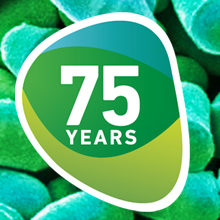Society launches new digital content hub on Exploring microbiology and genetics
11 December 2020

Throughout 2020 we have celebrated the 75th anniversary of our founding with a year of activities dedicated to demonstrating the impact of microbiologists’ past, present and future – bringing together and empowering communities that help shape the future of microbiology. The final of these digital content hubs is dedicated to Exploring microbiology and genetics.
Microbes are everywhere and affect almost all aspects of our lives. We cannot see them, but our world would not function without them. Bacteria, viruses, fungi, protists, archaea, algae and other microscopic life forms are on us and in us, in the air, soil and water, and in our food. They are in and on the surfaces of everything in our homes, workplaces and other environments. Most do not harm us and many are essential for the good health of humans, animals and the planet.
In 2018 we launched a call to the community to nominate a discovery, event or activity that best highlights how microbiology answers big questions by giving us knowledge of very small things.
From the submissions received from throughout the microbiology community, we have created a series of digital content hubs, each examining an important theme in detail, including testimony from our members working in each area and a wealth of rich and interactive content. We will continue to add new content to the hubs as it becomes available, and each one will grow and be added to beyond our anniversary year as a lasting resource for the microbiology community.
Exploring microbiology and genetics: content brought together for the first time
The final hub in our series, Exploring microbiology and genetics, will also examine the impact of CRISPR-Cas, the world of phage, and restriction enzymes and the process of genetic modification.
Content will include:
- An explainer on the impact of CRISPR-Cas and how its discovery has led to a sea of change in the microbiological sciences; the world of phage and why they are considered the most abundant biological entities on Earth; and more on research into the field of restriction enzymes and the process of genetic modification.
- Interviews and case studies from our members working on the innovative science involved in understanding microbiology and genetics.
- Resources available to explore – including more about CRISPR-Cas and microbiology, phage therapy, and microbiology and genetics. We share podcasts on microbial genomics amidst the Arctic crisis, explainer films and animation, a wealth of articles from our blog and our membership magazine Microbiology Today, as well as a dedicated collection from our journals.
We invite the community and all those interested in understanding more about microbiology and genetics to access this wide variety of content, brought together in one place for the first time.
Celebrating the impact of microbiologists past, present and future
Other anniversary events and activities during our anniversary year include our microbiology images project, which highlights how microbiology answers big questions by giving us knowledge of very small things.
You can enjoy microbiology in literature by taking part in a book club. Inspired by Jo Verran’s Bad Bugs Book Club, we have released digital guidance on starting your own microbiology book club and understanding how public perception of microbiology is influenced by the representation of the discipline in books and films.
We will be continuing work on our policy project, 'A Sustainable Future', demonstrating the value and raising the profile of microbiology in addressing the world’s biggest challenges.
Throughout 2020, we will convert our complete journal archive into the modern format, improving the visibility and reusability of our archive, and preserving our content for the long term.
